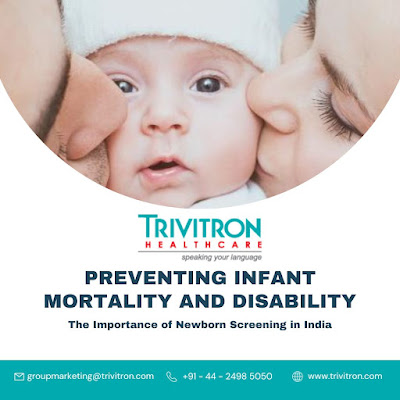Newborn Screening in India: Importance, Common Diseases and Prevalence, and the Need for Proper Execution and Awareness
Introduction
Newborn Screening (NBS) is the technique of screening babies for abnormalities that might cause serious sickness or mortality if not recognized and treated early. NBS screens newborns for a variety of metabolic and other abnormalities, allowing for intervention before the onset of symptoms or mental and/or physical disability. NBS is performed in various developed nations as a means of preventing morbidity and death. However, in India, the implementation of NBS is still in its early stages. In this article, we will discuss the need for NBS implementation in India, the common diseases and their prevalence, and the need for proper execution with proper awareness.
Why is NBS important in India?
Although the actual incidence in India is still under research, it is supposed that hearing problems and congenital cardiac abnormalities have an incidence of roughly 4:1000 and 5:1000, respectively, while the incidence of Inborn Error of Metabolism (IEMs) is approximately 1:1000. This high occurrence is a result of our country’s high prevalence of consanguinity. Delay or omission in diagnosing an IEM or other disorders detectable from birth, such as hypothyroidism, G6PD deficiency, and many more, may result in a significant mental decline in the affected babies. Many children acquire mental retardation, learning impairments, autism, dyslexia, behavioral abnormalities, and academic backwardness if undetected and mistreated. The diagnosis, treatment, and management of these affected babies impose a substantial financial and emotional strain on the parents. The most reasonable and cost-effective method of averting such tragedies would be to implement an newborn metabolic screening program that detects the majority of avoidable or curable IEMs and other genetic diseases, if not all of them.
Common Diseases and Their Prevalence
Mental retardation’s most prevalent avoidable cause is congenital hypothyroidism. The frequency is 1:2500–2800 live births worldwide. The most prevalent cause of CH, accounting for 75 to 80 % of all cases, is thyroid dysgenesis. The actual incidence of this condition in India is unknown. However, it seems to be much greater than in the rest of the globe. Not only is it the most prevalent avoidable cause of mental retardation, but the treatment cannot be afforded by everyone.
G6PD insufficiency is the most prevalent enzyme deficit, affecting about 400 million individuals worldwide. Additionally, it is the most prevalent genetic condition in India. Although the actual prevalence is unknown, a range of 2-27.9% has been observed by several studies in diverse areas. It is an X-linked recessive condition that manifests with hemolytic anemia and persistent jaundice and causes substantial morbidity and death in children.
PKU, MSUD, homocystinuria, methylmalonic academia, propionic academia, and isovaleric academia are some other common health concerns that be detected by the NBS method. The majority of these conditions are characterized by life-threatening episodes and may leave the afflicted kid with lasting neurological complications if left undiagnosed and untreated.
The Need for NBS Implementation and Proper Execution With Proper Awareness
Therefore, all metropolitan hospitals in India should perform NBS for at least the most prevalent diseases: Congenital Hypothyroidism, Congenital Adrenal Hyperplasia (CAH), and Glucose-6-Phosphate Dehydrogenase Deficiency (G6PD) deficiency. For rural areas, certain centers must be set up in the government hospital itself to cater to the need of the newborns, and they must make it mandatory that after every newborn birth, they must undergo this test.
Conclusion
In conclusion, NBS is a crucial preventive health measure that can save the lives of many infants and prevent disabilities. In India, where the incidence of genetic disorders is high, NBS implementation is essential. There is a need for a comprehensive and unified NBS program at the national level to cover all states, including rural areas, and ensure proper execution with proper awareness. The implementation of such a program can prevent disabilities, decrease morbidity and mortality, and reduce the economic burden on families and the healthcare system.
In addition to the need for a comprehensive and unified NBS program in India, it is worth noting that companies like Trivitron Healthcare manufacture and supply newborn screening kits that can aid in the detection of genetic disorders. Trivitron Healthcare's newborn screening kits is one such kit that can be used to screen for a range of metabolic disorders, including PKU, MSUD, homocystinuria, methylmalonic academia, propionic academia, and isovaleric academia. These kits can help hospitals and healthcare providers perform NBS with greater ease and accuracy, further highlighting the importance of implementing NBS in India. By detecting and treating genetic disorders early, we can save lives, prevent disabilities, and reduce the economic burden on families and the healthcare system.



Comments
Post a Comment